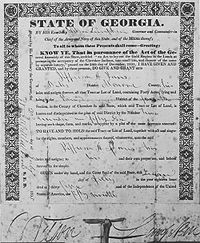
Gold Lottery of 1832
Encyclopedia

Georgia Land Lottery
The Georgia land lotteries were an early nineteenth century system of land distribution in Georgia. Under this system, qualifying citizens could register for a chance to win lots of land that had formerly belonged to the Creek Indians and the Cherokee Nation. The lottery system was utilized by the...
, a lottery system used by the State of Georgia
Georgia (U.S. state)
Georgia is a state located in the southeastern United States. It was established in 1732, the last of the original Thirteen Colonies. The state is named after King George II of Great Britain. Georgia was the fourth state to ratify the United States Constitution, on January 2, 1788...
between the years 1805 and 1832 to distribute land. It was authorized by the Georgia General Assembly
Georgia General Assembly
The Georgia General Assembly is the state legislature of the U.S. state of Georgia. It is bicameral, being composed of the Georgia House of Representatives and the Georgia Senate....
by an act of December 24, 1831 a few years after the start of the Georgia Gold Rush
Georgia Gold Rush
The Georgia Gold Rush was the second significant gold rush in the United States. It started in 1828 in the present day Lumpkin County near county seat Dahlonega, and soon spread through the North Georgia mountains, following the Georgia Gold Belt. By the early 1840s, gold became harder to find...
. The act specified that approximately one third of the 160 acre (0.6474976 km²) land districts to be distributed by lottery under the act of December 21, 1830 (the sixth land lottery), be designated as gold districts of 40 acres (161,874.4 m²) each and to be distributed in a separate lottery. The drawings for the Gold Lottery of 1832 occurred between October 22, 1832 and May 1, 1833 and applied to land that had been owned by the Cherokee Indians.
Those successful in the lottery had to pay a grant fee of $10.00 per lot. Those eligible were:
bachelors over the age of 18 who were 3 year residents of Georgia and citizens of United States; widows who were 3 year residents of Georgia; families of orphans who were 3 year residents of Georgia and citizens of United States; and married men or male heads of family who were 3 year residents of Georgia (residency requirement waived for officers in the army or navy of the United States) and citizens of United States. Those excluded were: anyone who was successful in any previous land lottery who had taken a grant of a land lot; anyone who had mined, or caused to be mined, gold, silver, or other metal in the Cherokee territory since June 1, 1830; any person who had taken up residence in the Cherokee territory, anyone who had been convicted of a felony in any court in Georgia; and anyone who was a member of "a horde of Thieves known as the Pony Club."
The 1833 Land Lottery was held in December, 1833 to, among other things, distribute lots and fractions from the Gold Lottery of 1832 that were not placed in the prize wheels during the Gold Lottery of 1832.
Source
- Website maintained by the Georgia Secretary of State (accessed October 30, 2006)
External links
- Cherokee County, Section 1, Gold District 1, 4 June 1832. One of the Gold District lottery maps in the Georgia Archives.

